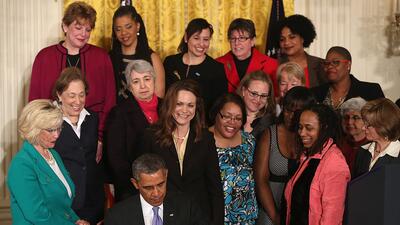Women’s Income Inequality – Our Story is Yet to be Written

Civil rights icon Dolores Huerta once said, “That's the history of the world. His story is told, hers isn't.” This is the story of every woman and certainly every Latina in the United States. Our stories are untold. Our women legislators are scarce. Our pay is not equal to that of a man.
As an 18 year old budding college freshman, I learned firsthand what equal pay for equal work meant.
I took on my first job as an undercover investigator at a Los Angeles-area retail store to help pay for my college expenses that were not covered by financial aid.
With little to no training, my spy job consisted of working as a sales clerk while secretly serving as an informant on employees suspected of stealing from the store. While the work at times was exhilarating and emotionally draining all at once, I was working on average more than 60 hours per week – at a whopping $9 an hour.
All the while my male counterparts’ workload was much lighter than mine and their salary was twice as much as mine.
During my two-year tenure with this company, more than eight employees were arrested for theft, which saved the company hundreds of thousands of dollars. While I was considered a star employee, I never once received a raise, much less a bonus, despite my male counterparts receiving a raise.
In retrospect, it never occurred to me that I should have asked for a raise or for my employer to propose one to me. It didn’t occur to me that I was in fact the only woman on the security team, which was predominantly made of white men.
Sadly, my story is fairly common. As a young worker and as a young Latina, I was just grateful to have a job -- never thinking of the value I was bringing to the company or that I was deserving of a raise or promotion despite male counterparts moving up the corporate ladder.
Today, as we mark Equal Pay Day, and draw attention to the continued pay discrepancies between the genders – with women making only 79 cents for every dollar earned by a man – let us not forget that for Latinas, the struggle is alive and real. Latinas only make 55 cents for every dollar earned by a white non-Hispanic man which means their Equal Pay Day does not arrive until November 1, 2016 – some 186 days from today.
This income inequality has a lifetime of consequence for Latinas, their families, and their communities. With more than a million dollar loss in wages over her lifetime, this pay discrepancy directly impacts everything from where she lives, the car she drives, the school her children can attend, and the income she’s able to save for college and retirement.
So why aren’t Latinas outraged about income inequality solely because they are women?
We should be outraged and we should do what we can to fix the inequality. We can start by electing more women leaders at the local, state, and national level that will close the pay gap and bring other issues important to women like paid family leave to the forefront.
This November we have an opportunity to elect Catherine Cortez Masto of Nevada as the first-ever Latina senator and add at least three new Latina voices to the House of Representatives. Their voices and stories are desperately needed as they can have a profound impact on public policies that impact every woman in this country.
Dolores Huerta was accurate in saying the history of the world was written by and for a man. It is up to us to make sure that the history yet to be written incorporates the diverse and inspiring stories of women. As women and Latinas, we cannot afford to do anything less.
Disclaimer: We selected this Op-Ed to be published in our opinion section as a contribution to public debate. The views and opinions expressed in this column are those of its author(s) and/or the organization(s) they represent and do not reflect the views or the editorial line of Univision Noticias.



